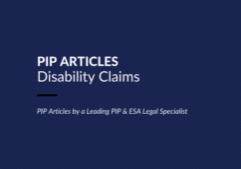Does Carers Allowance Affect PIP?
DLA and Carers Allowance
Confusion sometimes arises because of the names of benefits, especially when we have the care component of disability living allowance (DLA) and carers allowance. There are still plenty of adults who have yet to be moved from DLA to personal independence payment (PIP), and there are two other groups of claimants who won’t be moved onto PIP as part of this ‘migration’. One of these groups is made up of those who are currently on DLA and were aged at least 65 on 8 April 2013. They cannot choose to claim PIP instead, even where this would be to their advantage. The other group are those DLA claimants who are under age 16; their DLA will come to an end at their 16th birthday and they will be invited to claim PIP instead.
The only link between the care component of DLA and carers allowance, apart from the common use of the word ‘care’, is that the person with the disability benefit claim has to be on at least DLA middle rate care component before there is the option of someone claiming carers allowance for looking after them, so lowest rate care component is not a qualifying benefit for this purpose, and nor is even DLA Higher rate mobility component.
PIP and carers allowance
We still have a mobility component with PIP but the care component has been renamed the daily living component. There are just two rates of the daily living component, standard and enhanced; there is no equivalent of DLA lowest rate care component. Either rate of PIP daily living component is a qualifying benefit for carers allowance, allowing a claim to be made by the person providing care, but again, neither rate of the PIP mobility component will allow a claim to be made for carers allowance.
Someone receiving carers allowance does not affect the PIP that the person with the disability receives; you do not have to tell PIP that someone is going to claim carers allowance, or that such a claim has ended. It is important to make clear that if the person with the disability loses their award of PIP daily living component, this does affect entitlement to carers allowance. We have been calling that award of PIP the ‘qualifying benefit’ and if this ends, for any reason, then the person who has been getting carers allowance needs to tell their paying office of this change of circumstances because they no longer qualify for carers allowance. It does not matter if that PIP award ends because the disabled person has been in hospital for over 28 days, or if they have left the UK for too long, or if the decision to end the daily living component is being challenged or appealed to a tribunal. If there is no qualifying benefit in payment, there can be no entitlement to carers allowance. The carer is going to have a recoverable overpayment if the carers allowance office is not told promptly. If the DWP decide that the carer deliberately failed to disclose the ‘material fact’ of the qualifying benefit coming to an end, the risk is that criminal charges could be brought for benefit fraud, as well as the civil matter of the benefit overpayment.
Choices to be made
This aside, you sometimes have to think whether it makes sense for anyone to make a carers allowance claim. This depends on what other benefits the disabled person is receiving. If they also receive income support, income-based jobseekers allowance (JSA) or income-related employment support allowance (ESA), then if anyone receives carers allowance, the disabled person will not be entitled to a severe disability premium (SDP). As this article is being written, the weekly rate of carers allowance is £66.15. A decision might be made that the carer should claim carers allowance, even though it will prevent the disabled person receiving £65.85 as an SDP.
Other factors to consider
Things can get complicated and it would be sensible to explore the impact of the carer claiming carers allowance. There can be some interesting twists to consider. For example, if the disabled person gets an SDP as part of their other benefit, along with their PIP, just having that premium can protect them from being moved onto Universal Credit. Not too many people are better off on UC and once the move to that benefit has been made, there is no way back to the old benefit. There is no equivalent of the SDP with Universal Credit, so some people will lose out considerably. There are different ways to move onto UC; ‘natural’ and ‘managed’ migration, but the differences are outside the scope of this article. Depending on how a person is moved onto UC, there can be ‘transitional protection’ allowing them to keep the value of their SDP. Another factor that does arise is that carers allowance is classed as an ‘income replacement benefit’ and you can only receive one of these at a time. Another income replacement benefit is the state retirement pension. Where both are claimed, only the higher value income replacement benefit is paid, usually the state retirement pension. The person remains entitled to carers allowance but it cannot be paid. This can be important because the deciding factor is whether someone receives carers allowance, so a carer who gets retirement pension would remain entitled to carers allowance, even though it could not be paid. That entitlement is enough to trigger a carer element into the calculation of their pension credit, worth £36.85 a week. The disabled person would also keep their severe disability premium in this example.
I mention these examples to show that it would be worth exploring the options before you decide that someone is going to claim carers allowance. You must do what you think best, but go into it having done your homework.


 This PIP appeal in North London needed Pebbles help
This PIP appeal in North London needed Pebbles help